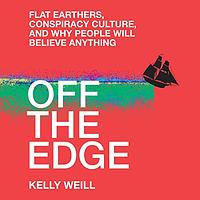You need to sign in or sign up before continuing.
Take a photo of a barcode or cover
203 reviews for:
Off the Edge: Flat Earthers, Conspiracy Culture, and Why People Will Believe Anything
Kelly Weill
203 reviews for:
Off the Edge: Flat Earthers, Conspiracy Culture, and Why People Will Believe Anything
Kelly Weill
funny
informative
lighthearted
reflective
medium-paced
Well researched, well written, and heartfelt. Highly recommend to anyone interested in conspiracy psychology and the psychology of flat earth in particular.
informative
medium-paced
Not bad, just didn't tell me much that I didn't already know about. It's a good book for people just getting into learning about conspiracy culture.
challenging
dark
informative
reflective
medium-paced
challenging
informative
reflective
medium-paced
informative
slow-paced
informative
medium-paced
thought it’d be more like cultish. informative!
Interesting information on the history of the flat earth movement, with developments leading up to the present day.
The author points out that unfortunately, attention from "globe earthers" has inadvertently helped to propel the flat earth movement. People will dispute it, mock it, imitate it in jest, make documentaries about it, and that will just lead to more people joining the movement. But the author points out that it's still important to discuss, to make people aware of these false beliefs and the movements behind them.
In addition to such accidental publicity, social media has really helped to propel the rise of conspiracy theories in the modern era. Social media loves attention. They need eyeballs to sell ads. And guiding people down rabbit holes of conspiracy theory videos, or encouraging them to join more and more extreme groups, is a good way to do that. Some people would spend many hours each and every day watching conspiracy videos.
Also interesting notes about how easily conspiracy theorists get tricked by con artists, despite their intense paranoia of scientists and governments.
The author points out that unfortunately, attention from "globe earthers" has inadvertently helped to propel the flat earth movement. People will dispute it, mock it, imitate it in jest, make documentaries about it, and that will just lead to more people joining the movement. But the author points out that it's still important to discuss, to make people aware of these false beliefs and the movements behind them.
In addition to such accidental publicity, social media has really helped to propel the rise of conspiracy theories in the modern era. Social media loves attention. They need eyeballs to sell ads. And guiding people down rabbit holes of conspiracy theory videos, or encouraging them to join more and more extreme groups, is a good way to do that. Some people would spend many hours each and every day watching conspiracy videos.
Also interesting notes about how easily conspiracy theorists get tricked by con artists, despite their intense paranoia of scientists and governments.
hopeful
informative
medium-paced





